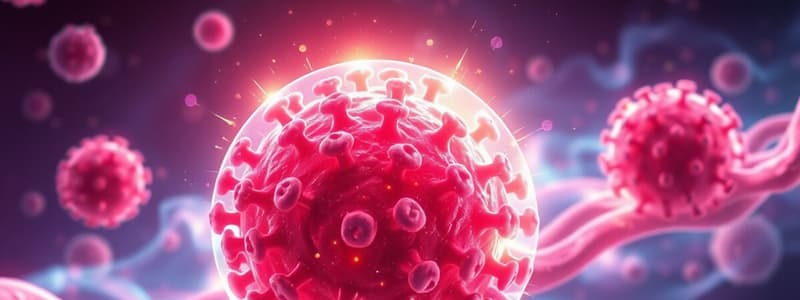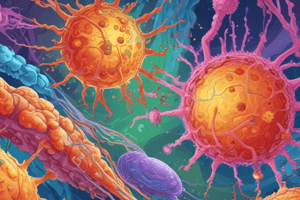Podcast
Questions and Answers
What is the first step in the processing of endocytosed antigens for MHC class II-associated presentation?
What is the first step in the processing of endocytosed antigens for MHC class II-associated presentation?
- Transport of MHC class II molecules to the Golgi apparatus
- Uptake of extracellular proteins into vesicular compartments of APCs (correct)
- Expression of peptide-class II complexes on the APC surface
- Association of processed peptides with MHC class II molecules
Which type of immune cell is primarily responsible for internalizing antigen using the BCR?
Which type of immune cell is primarily responsible for internalizing antigen using the BCR?
- Dendritic cell
- B lymphocyte (correct)
- Macrophage
- T lymphocyte
What role do cathepsins play in antigen processing?
What role do cathepsins play in antigen processing?
- They assist in the synthesis of MHC molecules in the ER
- They are critical for the degradation of internalized proteins (correct)
- They bind peptides to MHC class II molecules
- They transport peptides to the APC surface
What happens to MHC class II molecules after they are synthesized in the endoplasmic reticulum?
What happens to MHC class II molecules after they are synthesized in the endoplasmic reticulum?
Which type of antigen presents MHC class II-associated peptides after uptake primarily occurs through endocytosis?
Which type of antigen presents MHC class II-associated peptides after uptake primarily occurs through endocytosis?
What occurs during the association phase of processed peptides with MHC class II molecules?
What occurs during the association phase of processed peptides with MHC class II molecules?
What length are peptides typically generated from the degradation of proteins in endosomal compartments for MHC class II binding?
What length are peptides typically generated from the degradation of proteins in endosomal compartments for MHC class II binding?
Which pathway primarily generates peptides for MHC class I-associated presentation?
Which pathway primarily generates peptides for MHC class I-associated presentation?
What is the primary role of antigen-presenting cells (APCs) in the immune response?
What is the primary role of antigen-presenting cells (APCs) in the immune response?
What process allows dendritic cells to present antigens from infected cells to CD8+ T cells?
What process allows dendritic cells to present antigens from infected cells to CD8+ T cells?
What role does the proteasome play in antigen processing?
What role does the proteasome play in antigen processing?
What occurs during the endocytosis of antigens by dendritic cells?
What occurs during the endocytosis of antigens by dendritic cells?
Which component is essential for the assembly of peptide-MHC class I complexes?
Which component is essential for the assembly of peptide-MHC class I complexes?
What molecule is primarily responsible for presenting antigens to CD4+ T lymphocytes in MHC class II presentation?
What molecule is primarily responsible for presenting antigens to CD4+ T lymphocytes in MHC class II presentation?
Which of the following cells are classified as professional antigen presenting cells (APCs)?
Which of the following cells are classified as professional antigen presenting cells (APCs)?
In antigen processing, what is the purpose of endocytosis?
In antigen processing, what is the purpose of endocytosis?
How do peptide-MHC class I complexes assemble?
How do peptide-MHC class I complexes assemble?
What role does the proteasome play in peptide transport during antigen processing?
What role does the proteasome play in peptide transport during antigen processing?
Which cell types present antigens to differentiated CD4+ T lymphocytes during the effector phase?
Which cell types present antigens to differentiated CD4+ T lymphocytes during the effector phase?
Which of the following best describes the function of non-professional antigen presenting cells?
Which of the following best describes the function of non-professional antigen presenting cells?
What is the main difference between MHC class I and MHC class II molecules in terms of the types of T lymphocytes they interact with?
What is the main difference between MHC class I and MHC class II molecules in terms of the types of T lymphocytes they interact with?
What is the primary function of antigen presenting cells in the immune response?
What is the primary function of antigen presenting cells in the immune response?
Which of the following cells is NOT considered an antigen presenting cell?
Which of the following cells is NOT considered an antigen presenting cell?
What is the primary function of the proteasome in antigen processing?
What is the primary function of the proteasome in antigen processing?
Which T-cell type recognizes peptides presented by MHC class II molecules?
Which T-cell type recognizes peptides presented by MHC class II molecules?
What role do APCs (Antigen-Presenting Cells) play in the immune response?
What role do APCs (Antigen-Presenting Cells) play in the immune response?
How are peptides transported from the cytosol to the endoplasmic reticulum (ER)?
How are peptides transported from the cytosol to the endoplasmic reticulum (ER)?
What is required for the correct recognition of antigens by T-cell receptors (TCR)?
What is required for the correct recognition of antigens by T-cell receptors (TCR)?
What type of antigens do CD8+ T-cells specifically recognize?
What type of antigens do CD8+ T-cells specifically recognize?
What characterizes the recognition of antigens by γδ T-cell receptors?
What characterizes the recognition of antigens by γδ T-cell receptors?
What is the role of anchor residues in peptide binding to MHC molecules?
What is the role of anchor residues in peptide binding to MHC molecules?
How do MHC class I molecules differ in their antigen presentation compared to MHC class II molecules?
How do MHC class I molecules differ in their antigen presentation compared to MHC class II molecules?
What is the consequence of the self MHC restriction in T-cell recognition?
What is the consequence of the self MHC restriction in T-cell recognition?
Flashcards are hidden until you start studying
Study Notes
### Antigen Presentation
- The process of antigen presentation involves antigen processing, a process where APCs (Antigen Presenting cells) break down an antigen into peptides and display them on MHC (Major Histocompatibility Complex) molecules on their surface.
### Professional Antigen Presenting Cells (APCs)
- Dendritic cells, macrophages, and B lymphocytes are the professional APCs.
- Dendritic cells are critical for initiating T-cell responses by presenting antigens to naïve CD4+ and CD8+ T lymphocytes in the peripheral lymphoid organs.
- Macrophages present antigens to differentiated CD4+ T lymphocytes during the effector phase of cell-mediated immunity.
- B lymphocytes present antigens to helper T-cells (CD4+) during humoral immune response.
### Antigen Processing
- The pathways of antigen processing convert protein antigens into peptides and load them into MHC molecules.
- Protein antigens present in acidic vesicular compartments of APCs generate MHC class II-associated peptides, whereas antigens present in the cytosol generate MHC class I-associated peptides.
### MHC Class II Antigen Processing
- Uptake: APCs internalize extracellular proteins using receptors.
- Processing: Internalized proteins are degraded in endosomes and lysosomes into peptides, typically 14-20 amino acids long.
- MHC Class II Assembly: α and β chains of MHC class II molecules are synthesized in the endoplasmic reticulum (ER) and associate with the invariant chain (Ii) before moving to endosomes.
- Peptide Loading: In endosomes, Ii is removed, and processed peptides bind to MHC class II molecules.
- Surface Expression: MHC class II-peptide complexes are transported to the cell surface for recognition by CD4+ T lymphocytes.
### MHC Class I Antigen Processing
- Protein Source: Cytosolic proteins, including those from viruses or intracellular microbes, are processed.
- Proteasomal Degradation: Proteins in the cytosol are ubiquitinated and degraded by the proteasome into peptides.
- Peptide Transport: Peptides are transported to the ER lumen by the transporter associated with antigen presentation (TAP).
- MHC Class I Assembly: Peptides bind to MHC class I molecules in the lumen of the ER.
- Surface Expression: MHC class I-peptide complexes move through the Golgi apparatus and are expressed on the cell surface for recognition by CD8+ T lymphocytes.
### Co-stimulation
- Co-stimulatory signals are essential for full T-cell activation.
- Signal 1: Antigenic peptide bound to MHC engages the TCR-CD3 complex on the T cell.
- Signal 2: Co-stimulatory molecules, such as CD28 on T-cells, interact with the B7 family (CD80/CD86) on APCs.
### Regulation of co-stimulation
- Microbial products enhance antigen presentation by APCs.
- Toll-like receptors on APCs recognize microbes and induce expression of MHC molecules, co-stimulators, and cytokines that stimulate or recruit T-cells.
### Cross-presentation
- Dendritic cells can ingest infected cells and tumor cells and present antigens from these cells to CD8+ T cells through the MHC class I pathway, a process called cross-presentation or cross-priming.
### The T-cell Receptor (TCR)
- The TCR is a surface molecule found on T-cells.
- It recognizes antigen presented in the correct MHC context.
- Two types of TCRs exist: αβ TCR and γδ TCR.
- The αβ TCR is found on most T lymphocytes and recognizes antigen in an MHC-dependent manner.
- The γδ TCR is found in mucosal surfaces and recognizes antigen in an MHC-independent manner.
### The CD3 Complex
- The CD3 complex is closely associated with the TCR.
- It is made of four invariant proteins (γ, δ, ε, and ξ) and does not contribute to the specificity of the TCR.
- The CD3 complex is required for TCR surface expression during T-cell development.
- It transduces activation signals to the cell nucleus following TCR antigen interaction.
### Antigen Recognition by T Lymphocytes
- Most T lymphocytes recognize only peptides.
- They are specific for defined amino acid sequences in peptides.
- They recognize only a few key residues (anchor residues) in the peptide sequence.
- Peptides are recognized by T-cells only when bound to MHC within the appropriate MHC background.
- CD4+ T-cells are restricted to MHC class II, whereas CD8+ T-cells are restricted to MHC class I.
### B-cell Receptor (BCR)
- The BCR does not interact with MHC molecules.
- B-cells can recognize soluble antigens as well as cell-surface antigens.
- They recognize peptides, proteins, nucleic acids, polysaccharides, and lipids.
Studying That Suits You
Use AI to generate personalized quizzes and flashcards to suit your learning preferences.




